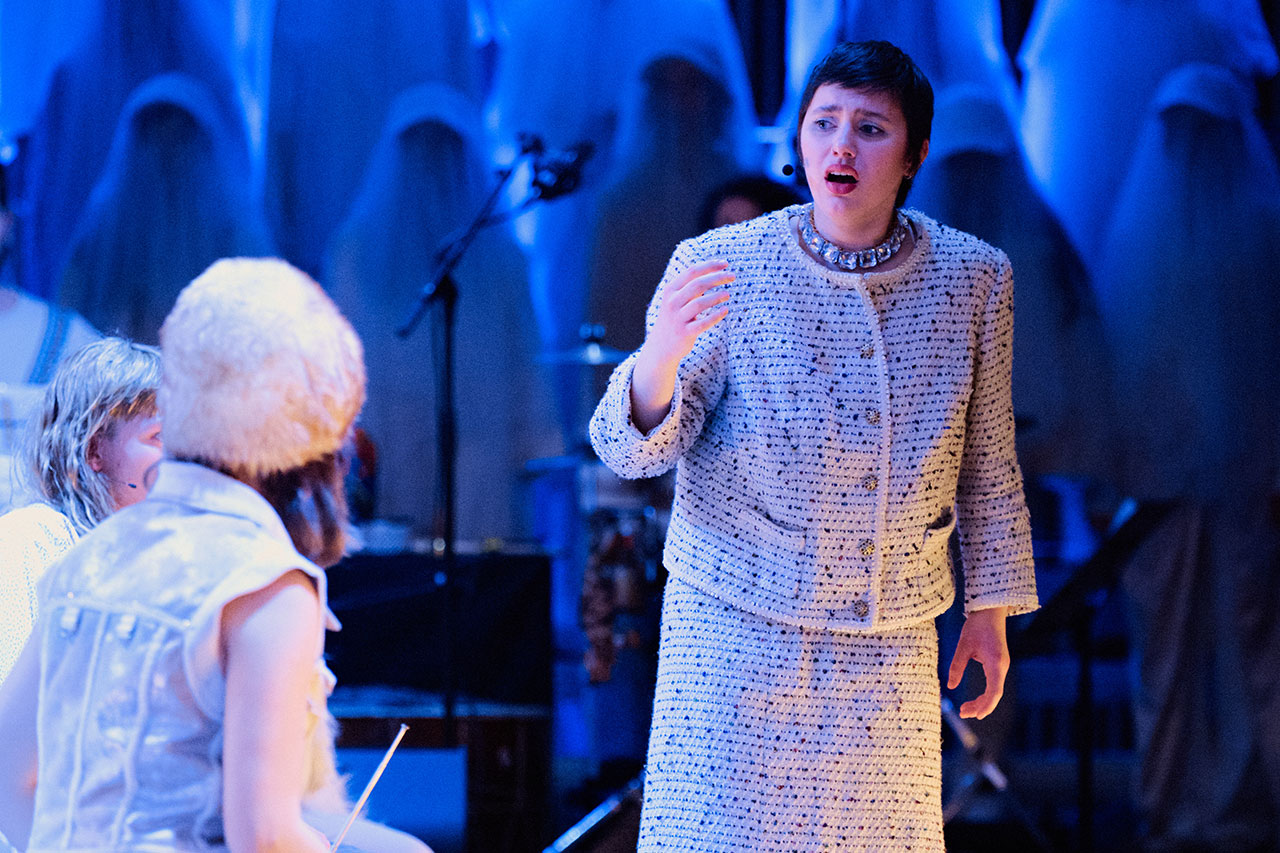
Director Gregory Caers and student Liv Paszkiewicz on Codes
“Art can undermine the individualism of our times”
Rituals and trusting your instincts are at the heart of the new production Codes, a striking collaboration between the director Gregory Caers and students at the Rotterdam vocational Theatre School and other colleges. This brand-new production, part of the Opera Forward Festival, was prompted by the 750th anniversary of Amsterdam. We talk about Caers’ approach.
In Codes, no fewer than 170 performers will take the main stage of Dutch National Opera & Ballet. It is not exactly Gregory Caers’ first time working on such a large scale. “I love the energy you get with a big group. What I do in my performances is get the performers to connect with one another through their intuition. That creates a synergy among the performers and that’s precisely the point where ritual and theatre meet.”
Caers was asked to create a production to mark Amsterdam’s 750th anniversary. “I started thinking about the city and that gave me the idea of the power of rituals in a community. Rituals are age-old practices in which people come together to celebrate something or process a negative experience,” he explains. “They let us connect to one another.” He points out that rituals were dominated by religion for a long time, but now he sees a new role for the arts: “In Codes, we are creating seven new physical rituals inspired by various cultures. The aim is for the spectators not only to see these rituals but also to experience a personal connection with them.”
Gregory Caers
“Art’s task is to undermine the individualism in society”
An intuitive approach
Caers finds it important that the performers you see on the stage are involved in co-creating that production. The student Liv Paszkiewicz is taking part in a Gregory Caers project for the Opera Forward Festival for the second year running. Paszkiewicz says that working with Caers is a process that revolves around intuition. “At the start, you’re often given only one hour to work on an assignment in a small group,” she says. “That teaches you to trust your instincts. It’s an approach that’s completely different to what we learn at the theatre school.”
“I find that when you let a group go beyond the technique, the performance has more of an emotional impact,” says Caers. “You achieve that by getting the players to a point where they are no longer thinking about what they’re doing, where they trust their own bodies. And that is precisely when you get the connection with rituals that engage the community. They operate through your body, not your head.”
Gregory Caers
“I never treat the performers like students; I have a professional relationship with them as fellow artists”
Caers also thinks it is important to have the students work in groups. “As individuals, the performers have nothing to gain in my productions. In my view, art’s task is to undermine the individualism in society. There’s already more than enough talk about the individual in modern society; it’s time to see what people can achieve together. I think that is more beneficial to the world of today.” Paszkiewicz adds: “What you feel during the performance is the power of the crowd. We really make it happen together. That was the case last year with about sixty people, and this year there’ll be 170 of us.”
Trust
To get that degree of intensity, you need trust. “I never treat the performers like students; I have a professional relationship with them as fellow artists. I take what they create seriously, which means they too take my work seriously. That way, the whole becomes more than the sum of the parts.” Paszkiewicz remembers precisely that feeling from the previous production: “We felt we were being taken seriously. It was the first time during our course that we were part of something so big. We rehearsed at Dutch National Opera & Ballet — which was quite something in its own right — and we also got the opportunity to see other performances. Feeling you’re part of a festival like that has an effect on you: it energises you and motivates you to continue with what you are doing.”

Gregory Caers
“There’s already more than enough talk about the individual in modern society”
Proper art
Caers wants to empower the students. That is also the aim of the composer Bas Gaakeer, who has been working with Caers for a while. “What I look for in movement, Bas looks for in his music. He writes compositions that let people transcend themselves. The students learn to trust in the sound they can produce, whereby technical imperfections don’t mean a loss in the intensity or expressiveness. In this edition, we also have an eighty-strong student chorus providing musical support for the physical and at times vocal performances of the theatre students. I’m personally really looking forward to that.”
Getting beyond mere technique and reaching that point where the students outdo themselves — that is what matters to Caers. “Whether you’re working with children, students, amateurs or trained professionals, if you empower people, you can create art that takes them to the next level. If I were to direct an opera with a group of renowned singers, I wouldn’t ask the same of them as what I ask of my students; that’s not what they are about. Equally, I can’t expect my students to deliver opera-quality singing performances. What I can look for is their strengths, what they have to say, their energy, their conviction. If you can do something with that as a maker, then you’re producing fully-fledged works of art.”
Text: Maxim Paulissen / Jasmijn van Wijnen
Codes (OFF) will be performed at Nationale Opera & Ballet from 16 March to 21 March, 2025




